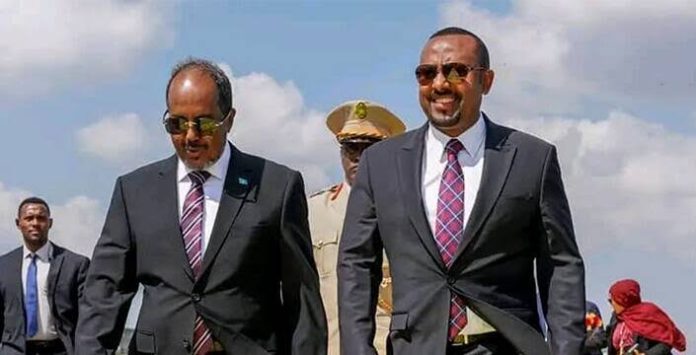Facebook Twitter (X) Instagram Somali Magazine - People's Magazine
Somali President Hassan Sheikh Mohamud and Ethiopian Prime Minister Abiy Ahmed held their first official meeting since signing the Ankara Declaration in December 2024. Their discussions, which took place on the sidelines of the 38th African Union (AU) Summit in Addis Ababa, focused on restoring diplomatic relations, strengthening security cooperation, and addressing Ethiopia’s bid for maritime access through Somalia.
The meeting marked a significant step in repairing ties between the two nations following a yearlong rift. Tensions escalated in early 2024 when Ethiopia signed a controversial Memorandum of Understanding (MoU) with Somaliland, seeking 20 kilometers of coastline for a naval base in exchange for potential recognition of Somaliland’s independence. Somalia, which considers Somaliland part of its territory, viewed the agreement as a violation of its sovereignty. In response, Mogadishu severed diplomatic ties with Ethiopia, recalled its ambassador, and threatened to expel Ethiopian troops from Somali soil.
In an effort to de-escalate the crisis, Turkey mediated negotiations that led to the Ankara Declaration on December 11, 2024. The agreement paved the way for diplomatic talks and required Ethiopia to negotiate any future maritime access directly with Somalia. In January 2025, the two countries restored full diplomatic representation, setting the stage for the high-level discussions in Addis Ababa.
One of the key points of the latest meeting was the status of Ethiopian troops in Somalia. Just months ago, Mogadishu had vowed to remove Ethiopian forces, citing concerns over sovereignty violations. Ethiopia, which had deployed up to 10,000 troops under the African Union Transition Mission in Somalia (ATMIS), is now seeking to maintain a military presence under the newly formed African Union Stabilization Support Mission in Somalia (AUSSOM). Somali officials, including Deputy Foreign Minister Ali Omar ‘Balcad,’ confirmed that discussions are underway to determine Ethiopia’s role within the new mission. However, most of the troop quotas have already been assigned, complicating Ethiopia’s request to continue operations against al-Shabaab.
Beyond security matters, Ethiopia’s long-standing ambition for maritime access was a major topic of discussion. The landlocked nation currently relies on Djibouti for 95% of its maritime trade but has been actively seeking alternative routes. While Somalia recognizes the economic potential of port agreements with Ethiopia, it remains cautious about any deal that could compromise its sovereignty over coastal territories. Ports in Mogadishu and Kismayo have been suggested as potential trade routes for Ethiopia, but security concerns and logistical hurdles remain significant barriers to progress.
The ongoing presence of al-Shabaab, which controls or threatens key transportation routes between Ethiopia and Somali ports, poses additional challenges. The militant group has taken advantage of regional instability to launch attacks aimed at undermining state authority and disrupting diplomatic negotiations. Furthermore, internal Somali political divisions complicate the situation, with opposition factions expressing skepticism about any agreement that accommodates Ethiopia’s maritime ambitions.
While the meeting in Addis Ababa marked a major step toward reconciliation, several key issues remain unresolved. Ethiopia has not formally withdrawn from its MoU with Somaliland, raising concerns that it may still be pursuing a dual-track strategy for securing sea access. Somali officials continue to push for a clear commitment from Ethiopia to fully respect Somalia’s territorial integrity before advancing any discussions on economic cooperation.
Despite these challenges, the high-level talks signal a willingness from both sides to find diplomatic solutions and stabilize relations. As negotiations continue, the future of security cooperation, trade agreements, and regional stability will depend on sustained diplomatic engagement and mutual respect for sovereignty. The outcome of these discussions will have lasting implications for both nations and the broader Horn of Africa region.

